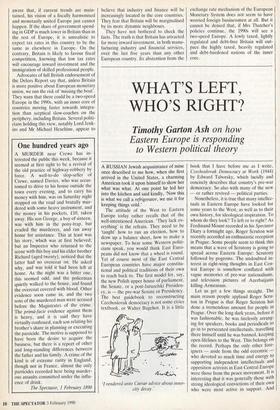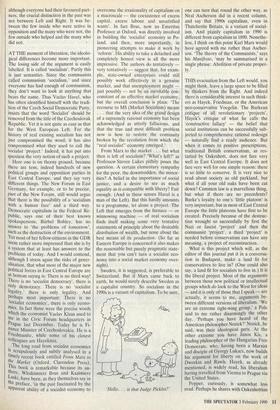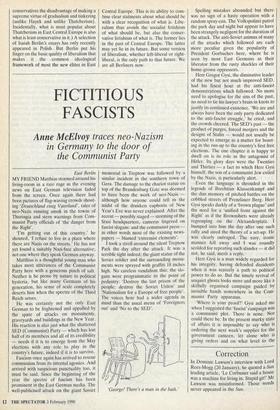WHAT'S LEFT, WHO'S RIGHT?
Timothy Garton Ash on how
Eastern Europe is responding to Western political theory
A RUSSIAN Jewish acquaintance of mine once described to me how, when she first arrived in the United States, a charming American took it upon himself to show her what was what. At one point he led her into the kitchen and said kindly, 'Now this is what we call a refrigerator, we use it for keeping things cold.'
The attitude of the West to Eastern Europe today rather recalls that of the well-intentioned American. 'They lack ev- erything' is the refrain. They need to be 'taught' how to run an election, how to draw up a balance sheet, how to make a newspaper. To hear some Western politi- cians speak, you would think East Euro- peans did not know that a wheel is round. Yet of course most of the East Central European countries have major constitu- tional and political traditions of their own to reach back to. The first model for, say, the new Polish upper house of parliament, the Senate, or a post-Jaruzelski Presiden- cy, is — the pre-war Senate or Presidency. The best guidebook to reconstructing Czechoslovak democracy is not some civics textbook, or Walter Bagehot, It is a little 1 rendered unto Caesar advice about inner- city decay.' book that I have before me as I write, Czechoslovak Democracy at Work (1944) by Edward Taborsky, which lucidly and concisely describes that country's pre-war democracy. So also with many of the new — or rather revived — political parties.
Nonetheless, it is true that many intellec- tuals in Eastern Europe have looked for some years to the West, as well as to their own history, for ideological inspiration. To whom do they look? To left or to right? As Ferdinand Mount recorded in his Spectator Diary a fortnight ago, Roger Scruton was recently accorded an enthusiastic reception in Prague. Some people seem to think this means that a wave of Scrutony is going to spread across Eastern Europe: Scrutony followed by pogroms. The undoubted in- terest in right-wing thoughts in East Cen- tral Europe is somehow conflated with vague memories of pre-war nationalisms, and television pictures of Azerbaijanis killing Armenians.
Let us get a few things straight. The main reason people applaud Roger Scru- ton in Prague is that Roger Scruton has done a tremendous amount for people in Prague. Over the long dark-years, before it was fashionable, he was tirelessly arrang- ing for speakers, books and periodicals to go in to persecuted intellectuals, travelling there himself until he was banned, keeping open lifelines to the West. This belongs on the record. Perhaps the only other fore- igners — aside from the odd eccentric — who devoted so much time and energy to supporting independent intellectuals and opposition activists in East Central Europe were those from the peace movement. It is interesting that it was generally those with strong ideological convictions of their own who were most active in support. And
although everyone had their favoured part- ners, the crucial distinction in the past was not between Left and Right. It was be- tween the few inside who were active in opposition and the many who were not, the few outside who helped and the many who did not.
AT THE moment of liberation, the ideolo- gical differences become more important. The losing side of the argument is easily labelled. It is called 'socialism'. Partly this is just semantics. Since the communists called communism 'socialism,' and since everyone has had enough of communism, they don't want to look at anything that bears the name. Thus Vaclav Havel, who has often identified himself with the tradi- tion of the Czech Social Democratic Party, insists that the word 'Socialist' should be removed from the title of the Czechoslovak Republic. Yet it is not quite as easy as that for the West European Left. For the history of real existing socialism has not Just compromised the word; it has also compromised what they used to call the socialist 'project.' Indeed, it has put. into question the very notion of such a project.
Here one is on thorny ground, because there are tens, indeed hundreds of new Political groups and opposition parties in East Central Europe, and they say very different things. The New Forum in East Germany, for example, or to be precise, Part of the New Forum, still would argue that there is the possibility of a 'socialism With a human face' and a third way. Democratic capitalism in the Federal Re- public, says one of their best known Spokespersons, Barbel Bohley, has no answer to 'the problems of tomorrow', such as the destruction of the environment. Yet most of her fellow-citizens in the GDR seem rather more impressed than she is by a system that at least has answers to the Problems of today. And I would contend, although I stress again the risks of gener- alisation, that what most of the major new Political forces in East Central Europe are at bottom saying is: There is no third way! There is no 'socialist democracy', there is Only democracy. There is no 'socialist legality,' there is only legality. And Perhaps most important: There is no 'socialist economics', there is only econo- mies. In fact those were the precise words which the economist Vaclay Klaus used to nle in the Civic Forum headquarters in Prague last December. Today he is Fi- nance Minister of Czechoslovakia. He is a Friedmanite, while some of his closest Colleagues are Hayekites. The long road from socialist economics IS scrupulously and subtly analysed in a timely recent book entitled From Marx to the Market (Oxford, Clarendon Press). This book is remarkable because its au- thors, Wlodzimierz Brus and Kazimierz Laski, have been as they themselves say in the preface, 'in the past fascinated by the apparent ability of a socialist economy to
overcome the irrationality of capitalism on a macroscale — the coexistence of excess capital, excess labour and unsatisfied wants'. In fact Brus, now an Emeritus Professor at Oxford, was directly involved in building the 'socialist' economy in Po- land, and then, more importantly, in pioneering attempts to make it work by 'reform'. His ability to take a detached and completely honest view is all the more impressive. The authors do tentatively — very tentatively — suggest that, for exam- ple, state-owned enterprises could still possibly work effectively in a genuine market, and that unemployment might — just possibly — not be an inevitable con- comitant Of an effective market economy, but the overall conclusion is plain: 'The recourse to MS (Market Socialism) means . . . that the very idea of the grand design of a supremely rational economy has been acknowledged as utterly fallacious, and that the true and most difficult problem now is how to restore the continuity broken by the revolution from which the "real socialist" economy emerged.'
From Marx to the market . . but what then is left of socialism? 'What's left?' as Professop Steven Lukes pithily poses the question. A certain elementary sympathy for the poor, the downtrodden, the ininQr- itics? A belief in the importance of social justice, and a desire to see as much equality as is compatible with liberty? Fair enough. (And in these senses Havel is a man of the Left). But this hardly amounts to a programme, let alone a project. The Left that emerges from the furnace — or winnowing machine — of real socialism finds itself making some very tentative statements of principle about the desirable distribution of wealth, but none about the best means of its production. (So far as Eastern Europe is concerned it also makes the reasonable but purely pragmatic state- ment that you can't turn a socialist eco- nomy into a social market economy over- night).
Sweden, it is suggested, is preferable to Switzerland. But if Marx came back to earth, he would surely describe Sweden as a capitalist country. So socialism in the 1990s is a variant of capitalism. To be sure, . . is that Judge Pickles?' one can turn that round the other way, as Neal Ascherson did in a recent column, and say that 1990s capitalism, even in Thatcherite Britain, is a variant of social- ism. And plainly capitalism in 1990 is different from capitalism in 1890. Nonethe- less, I think on this point Karl Marx would have agreed with me rather than Ascher- son. 'The theory of the Communists,' says his Manifesto, 'may be summarised in a single phrase: Abolition of private proper- ty.'
THIS evacuation from the Left would, you might think, leave a large space to be filled by thinkers from the Right. And indeed there is considerable interest in such think- ers as Hayek, Friedman, or the American neo-conservative Voegelin. The Burkean critique of all revolutionary 'projects', Hayek's critique of what he calls the 'constructive fallacy' — the belief that social institutions can be successfully sub- jected to comprehensive rational redesign — naturally find a ready audience. But when it comes to positive prescriptions, traditional British conservatism, as res- tarted by Oakeshott, does not fare very well in East Central Europe. It does not fare very well for one simple reason: there is so little to conserve. It is very nice to read about society as old parkland, but what if all your old oaks have been cut down? Common law is a marvellous thing, but what if there are no precedents? Burke's loyalty to one's 'little platoon' Is very important, but in most of East Central Europe the little platoons have first to be created. Precisely because of the destruc- tion wrought so successfully by first the Nazi or fascist 'project' and then the communist 'project', a third 'project' is needed before conservatism can have any meaning, a project of reconstruction.
What is this project which will, as the editor of this journal put it in a conversa- tion in Budapest, make a land fit for conservatives to live in? (One could also say, a land fit for socialists to live in.) It is the liberal project. Most of the arguments between those new political or intellectual groups which do look to the West for ideas — and it is only of those that I speak — are actually, it seems to me, arguments be- tween different versions of liberalism. 'We are an extreme right-wing group,' a Pole said to me rather disarmingly the other day. Perhaps you have heard of the American philosopher Nozick?' Nozick, he said, was their ideological guru. At the other extreme you have Janos Kis, a leading philosopher of the Hungarian Free Democrats, who, having been a Marxist and disciple of Gyorgy Lukacs, now builds his argument for liberty on the work of Dworkin and Rawls. Hayek, as already mentioned, is widely read, his liberalism having travelled from Vienna to Prague via the United States.
Popper, curiously, is somewhat less read. Perhaps he shares with Oakeshottian conservatives the disadvantage of making a supreme virtue of gradualism and tinkering (unlike Hayek and unlike Thatcherism). Incidentally, what is most popular. about Thatcherism in East Central Enrope is also what is least conservative in it.) A selection of Isaiah Berlin's essays has only recently appeared in Polish. But Berlin put his finger on the basic quality of liberalism that makes it the common ideological framework of most the new elites in East Central Europe. This is its ability to com- bine clear statments about what should be with a clear recognition of what is. Libe- ralism thus avoids the socialist fetishism of what should be, but also the conser- vative fetishism of what is. The former lies in the past of Central Europe. The latter may yet lie in its future. But some version of liberalism, whether left-liberal or right- liberal, is the only path to that future. We are all Berliners now.




















































 Previous page
Previous page